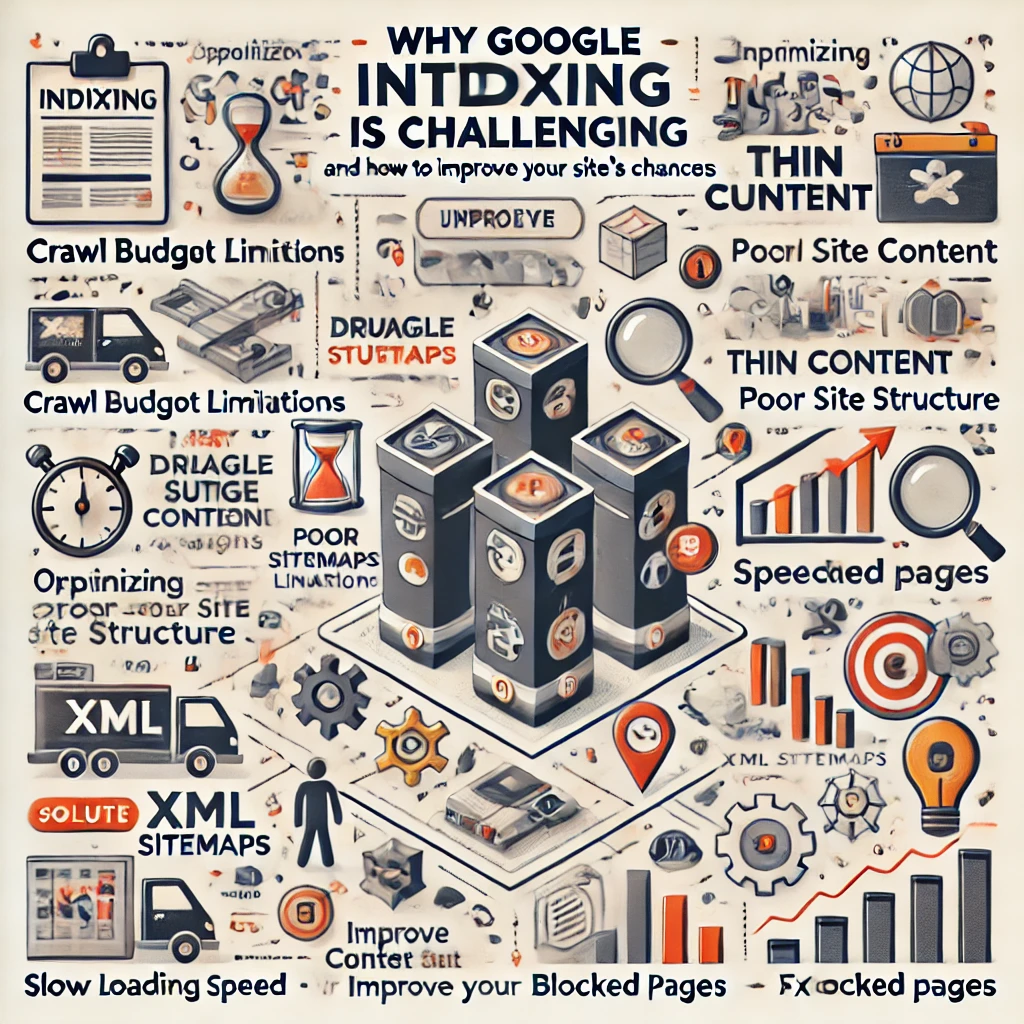Getting indexed by Google is essential for any website’s visibility, yet it can be a challenging process due to the vast amount of content online and Google’s complex algorithms. This guide explains the factors that affect indexing, common obstacles, and best practices to help your site get indexed faster and improve its rankings.
What is Google Indexing?
Google indexing is the process by which Google crawls, analyzes, and stores a webpage in its database. Once a page is indexed, it becomes eligible to appear in search results. Indexing is critical for SEO because if your site isn’t indexed, it won’t be visible in Google’s search results, which drastically reduces organic traffic potential.
Why Google Indexing is Critical for SEO Success
Indexing directly impacts your website’s visibility and search rankings. When a page is indexed, it becomes part of Google’s search engine database, meaning it can show up in relevant search results. Without indexing, all your SEO efforts remain unseen, making indexing one of the first steps in a successful SEO strategy.
Overview of Google’s Indexing Process
Google’s indexing process involves crawling (discovering pages), rendering (processing the content), and storing it in Google’s index. Crawlers, or “Googlebots,” explore links across the web, analyze content, and organize it by relevance and quality. Google prioritizes high-quality, mobile-optimized, and relevant content, but certain challenges can delay or even prevent indexing.
Common Challenges in Getting Indexed by Google
High Volume of Online Content
With billions of webpages published daily, Google faces a massive indexing workload. This high content volume means Google often prioritizes established, authoritative sites, making it difficult for new or less authoritative sites to get indexed quickly.
Algorithm Complexity
Google’s algorithm considers hundreds of factors to determine which pages to index and rank. The algorithm evaluates elements like relevance, authority, user experience, and technical performance. This complexity means your content must meet multiple criteria to earn indexing priority.
Website Technical Issues
Technical issues such as crawlability errors, broken links, or slow loading times can hinder Google’s ability to index your site. Google’s bots may skip pages that are hard to crawl or fail to load quickly, which can leave valuable content unindexed.
Factors that Affect Google Indexing Speed
Site Structure and Organization
A well-organized website structure allows Google’s crawlers to navigate your site more easily. Clear navigation, logical link hierarchies, and a clean URL structure improve the chances of faster indexing.
Quality and Relevance of Content
Content quality is a priority for Google. Pages with in-depth, relevant, and valuable content are more likely to be indexed quickly. Thin, duplicated, or low-value content may lead to delays or exclusion from the index.
Mobile Optimization and Indexing
Since Google introduced mobile-first indexing, mobile optimization has become essential. Google prioritizes mobile-friendly sites for indexing and ranking, meaning responsive design, fast loading speeds, and optimized mobile navigation are now crucial.
Best Practices for Improving Google Indexing
Creating a Comprehensive Sitemap
A sitemap is a file that lists all the pages on your site, helping search engines like Google discover and prioritize content for indexing. Submit your sitemap to Google through Search Console to ensure Google is aware of all your site’s pages.
Using Internal Links Strategically
Internal links help Google crawlers understand the structure of your website and locate important pages. Use strategic internal linking to connect relevant pages and guide crawlers to high-priority content.
Ensuring Fast Page Load Speeds
Page load speed affects user experience and Google’s indexing speed. Slow pages may be ignored or crawled less frequently. Use tools like Google PageSpeed Insights or GTMetrix to analyze and improve page load times.
Leveraging Google Search Console for Indexing Success
Submitting a URL for Indexing
Google Search Console allows you to manually submit URLs for indexing. This feature is helpful when you publish new content or update existing pages and want to prompt Google to index the changes sooner.
Understanding Index Coverage Reports
Index Coverage reports in Search Console provide insights into which pages are indexed and any issues preventing indexing. Regularly reviewing this report helps you identify and fix indexing obstacles.
Content Strategies to Improve Indexing Potential
Consistent Content Updates
Updating content regularly signals to Google that your site is active and relevant. Fresh content encourages more frequent crawling, which can help new pages get indexed faster.
Targeting Long-Tail Keywords
Long-tail keywords are less competitive and easier to rank for. By targeting these keywords, you increase the likelihood of getting indexed and attracting niche audiences.
Using Structured Data and Schema Markup
Schema markup adds structured data to your content, helping Google understand the context. By implementing schema for things like FAQs, reviews, or events, you enhance indexing and boost visibility in rich snippets.
Building Quality Backlinks to Boost Indexing
Why Backlinks Influence Indexing
Backlinks from reputable sites signal to Google that your content is valuable and worth indexing. The more quality backlinks you have, the more likely Google is to prioritize your pages.
Tips for Earning Quality Backlinks
Build backlinks by creating shareable, authoritative content and networking with industry influencers. Guest posting, collaborating with bloggers, and sharing data-driven resources are effective ways to acquire backlinks.
How to Monitor Google Indexing Status
Tracking Indexing Through Search Console
Use Search Console to monitor your indexing status. Tools like the URL inspection feature and Index Coverage report allow you to see which pages are indexed and identify issues affecting indexing.
Monitoring Indexing via Google Analytics
Google Analytics provides insights into site traffic and user behavior, indirectly showing whether pages are indexed. If a new page doesn’t receive organic traffic, it may not be indexed yet.
Advanced Tips for Faster Google Indexing
Accelerated Mobile Pages (AMP)
AMP is a framework that creates fast-loading pages optimized for mobile. AMP pages are more likely to be indexed quickly and can appear in Google’s Top Stories and Discover features, enhancing visibility.
Leveraging Social Media for Visibility
While social media doesn’t directly affect indexing, social signals can drive traffic and make content more discoverable. More visits from social channels can increase the likelihood of Google crawling and indexing your site.
Using Google News and Discovery for Exposure
Optimizing content for Google News or Google Discover can lead to faster indexing. News-worthy, timely, or trending content often receives quicker indexing due to its relevance and demand.
Conclusion
Getting indexed by Google can be challenging, but following best practices and leveraging tools like Google Search Console can improve your chances. Ensure your site is well-structured, optimized for speed, and filled with valuable content to stay ahead in search rankings. Regular monitoring and adjusting your SEO efforts based on indexing data will help keep your website competitive and visible.






